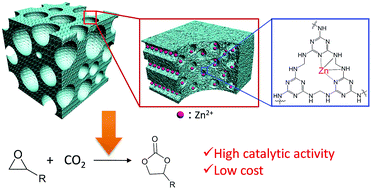Hierarchical porous metallized poly-melamine-formaldehyde (PMF) as a low-cost and high-efficiency catalyst for cyclic carbonate synthesis from CO2 and epoxides†
Abstract
The deployment of fossil resources such as petroleum, coal and natural gas to produce fuels and chemicals has resulted in excessive carbon dioxide (CO2) emissions and serious environmental issues. The implementation of CO2 utilization as a raw material for synthesis of fuels and chemicals has potential to reduce CO2 emissions and close the carbon cycle. Cyclic carbonates, materials used as building blocks for polymers or green solvents in batteries, can be synthesized from CO2 and alkylene oxides. Although a variety of catalysts have been synthesized to activate CO2 and alkylene oxides for transformation into cyclic carbonates, either the catalytic efficiency is low or the catalyst cost is high. In the present work, we report a hierarchical porous metallized poly-melamine-formaldehyde (PMF) polymer catalyst that has a 100-fold monomer cost reduction and six- to several hundred-fold activity enhancement compared to the state-of-the-art catalysts for propylene carbonate synthesis from epoxide and CO2 under the same reaction conditions. The hierarchically interconnected macro-, meso- and micro-pore structures in PMF that are formed via one-step high internal phase emulsion polymerization facilitate mass transport and accessibility to active sites. The high density of aminal groups and triazine rings in PMF provides multiple sites for CO2 adsorption and the subsequent reaction with epoxide. The unprecedented low-cost and high-efficiency of metallized PMF as well as the simplicity in its synthesis exhibit great potential in the synthesis of cyclic carbonates for the chemical and plastics industries.



 Please wait while we load your content...
Please wait while we load your content...